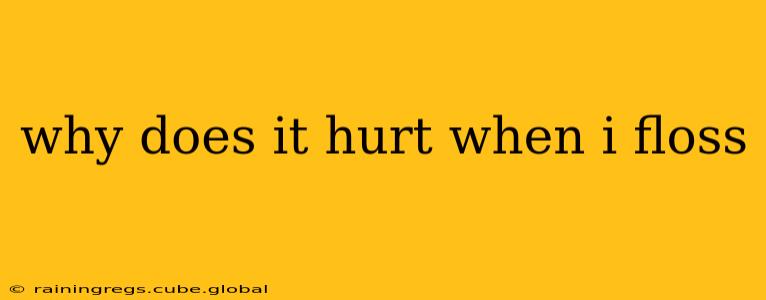Flossing is crucial for maintaining good oral hygiene, yet many people avoid it because it hurts. Pain during flossing usually indicates a problem, not a normal reaction. Let's explore the common reasons why flossing hurts and what you can do to make the process more comfortable and effective.
Why Does Flossing Hurt My Gums?
Gum pain during flossing is the most frequent complaint. This often stems from:
-
Gingivitis: Inflamed gums (gingivitis) are highly sensitive. Bacteria build-up along the gum line irritates the tissues, making them bleed and hurt when touched by floss. This is a clear sign you need to floss more regularly, not less! The initial discomfort will likely lessen as your gums heal with consistent flossing.
-
Aggressive Flossing: Using too much force when flossing can injure your gums, causing bleeding and pain. Remember, gentle is key. The floss should gently slide between your teeth, not aggressively scrape against your gums.
-
Improper Flossing Technique: Using the incorrect technique can also lead to gum irritation and bleeding. The sawing motion often taught in the past can be quite damaging. A gentler "C" shaped curve around each tooth is much more effective and less damaging.
-
Plaque Buildup: A significant accumulation of plaque and tartar can irritate the gums, making them sore and sensitive to flossing. Professional cleaning by a dentist or hygienist can remove stubborn plaque and tartar buildup, relieving the pain.
What If My Gums Bleed When I Floss?
Bleeding gums while flossing, while unpleasant, is often a sign of gum disease in its early stages (gingivitis). Don't let this discourage you from flossing! Consistent flossing, along with brushing, can actually help improve the health of your gums over time. However, persistent bleeding should warrant a visit to your dentist.
Is it Normal for Flossing to Hurt?
No, it's not normal for flossing to hurt consistently. Mild discomfort might be felt initially if you haven't flossed regularly, but sharp pain or persistent bleeding indicates a problem that requires attention.
How Can I Make Flossing Less Painful?
Here are several strategies to make flossing more comfortable:
-
Use the Right Floss: Experiment with different types of floss. Waxed floss often slides more easily between teeth than unwaxed floss. Dental tape, which is wider and flatter than floss, might also be a gentler option. Consider floss picks for easier handling.
-
Gentle Technique: Focus on a slow, gentle approach. Avoid snapping the floss between your teeth. Curve the floss gently against each tooth, ensuring you clean the entire tooth surface.
-
Start Slowly: If you haven't flossed in a while, begin by flossing just a few teeth each day and gradually increase the number as your gums become healthier and less sensitive.
-
Regular Dental Checkups: Regular visits to your dentist are essential for maintaining optimal oral health. Your dentist can identify and address any underlying issues contributing to gum pain or bleeding.
Why Does Flossing Hurt Between My Teeth?
Pain between your teeth during flossing may be due to:
-
Tight Contacts: If your teeth are very closely spaced, flossing might feel a little tighter, even with proper technique. However, forcing the floss could damage your gums. Try using a different type of floss, such as waxed floss or dental tape.
-
Dental Work: Recent dental work, such as fillings or crowns, might be slightly sensitive to flossing for a short period.
-
Cavities: Existing cavities can cause pain when the floss touches the affected area.
When Should I See a Dentist About Flossing Pain?
Consult your dentist if:
- Your gums bleed consistently or excessively while flossing.
- You experience persistent pain during flossing.
- You have significant gum swelling or redness.
- You notice any changes in your teeth or gums.
Remember, consistent, gentle flossing is a vital part of maintaining good oral health. Don't let pain deter you; identify the cause and work towards a comfortable and effective flossing routine. Your dentist can provide personalized advice and support.
